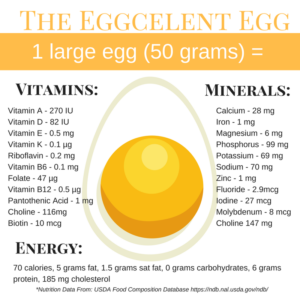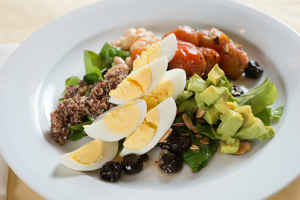|
|
|
|
In recent headlines, eggs have been receiving more attention. From their health benefits to possible health risk, information about eggs is everywhere—with this information also comes some confusion.
Are eggs healthy to eat? How much? How often? What type is best to buy? What does the label mean? This newsletter edition answers those burning questions you have about eggs.
Have an eggcellent day! |
|
|
Breaking Down The Egg: Nutrition 101
|
|
According to the 2015 Dietary Guidelines for Americans (DGA), eggs are an affordable, accessible, nutrient-rich source of high-quality protein, that can be eaten as part of a healthful diet. For about 30 cents and 70 calories a piece, one large egg provides varying amounts of 21 essential vitamins and minerals, high-quality protein, and the antioxidants lutein and zeaxanthin.
Here is the complete nutrition breakdown:

Power in the Yolk:
Most of the nutrition is found primarily in the bright and flavorful yolk. Eating egg whites alone can cause biotin deficiency and it also provides a smaller amount of nutrition compared to its whole yolk counterpart. Whole eggs are a nutrition powerhouse and a valuable source of many important nutrients, vitamins, and minerals. It should be noted though, that the cholesterol “myth” surrounding the egg yolk shouldn’t be completely thrown out the window. There is still a population of hyper-responders—people who respond quickly and to a greater extent—to dietary cholesterol. There are also genetic predispositions of existing conditions affecting the amount of whole eggs a person should consume weekly. It is important to know what works best for your body, your health condition, and how you respond to dietary cholesterol.
How Much and How Often Should You Eat Eggs?
The American Heart Association and the Dietary Guidelines for Americans recommend no more than 300 milligrams a day of dietary cholesterol. While there is no specific limit on eggs, one large egg has about 185 milligrams of cholesterol. Therefore we recommend one egg yolk per day, or 7 whole eggs per week.
|
|
|
|
|
| Mediterranean Vegetable Salad |
|
|

Recipe by Egg Nutrition Center
Ingredient:
- 8 eggs, large, hard-boiled
- 1 cup red quinoa
- 1 pint cherry tomatoes
- 1 cup dried cherries, plumped in hot water
- 1 cup mint, stemmed
- 2 cups arugula, stemmed
- 2 cups watercress, stemmed
- 1 cup almonds, toasted
- 1 1/2 cups white beans, drained and rinsed
- 2 each avocado, pitted and cubed
- Fresh ground black pepper (as needed)
For Preserved Lemon Vinaigrette
- 2 tablespoons shallot, minced
- 3/4 cup olive oil
- 2 tablespoons lemon juice
- 2 tablespoons apple cider vinegar
- 1 teaspoons dijon mustard
- 2 teaspoons honey
- 1/4 teaspoons chile de arbol, seeded, crushed
- 2 tablespoons lemon, zest of preserved lemon peel, minced
Directions
For the quinoa: Bring quinoa and 2 cups of water to a boil in a medium saucepan. Cover, reduce heat to low, and simmer until quinoa is tender, about 8 to 10 minutes. Remove pan from heat and let sit for 15 minutes. Fluff quinoa with a fork; transfer to a large bowl.
For the cherry tomatoes: Prepare a grill for medium-high heat. Grill tomatoes turning occasionally, until charred in spots and tomatoes begin to split, about 6 to 8 minutes. Remove and let cool to room temperature.
For the lemon vinaigrette: Purée shallot, oil, lemon juice, vinegar, mustard, honey, and chile in a blender until smooth. Place in a bowl and add the lemon zest and preserved lemon; mix to combine.
Assembly: Cut the hard boiled eggs into little wedges. Drain the cherries. In a small bowl, add the mint, arugula, watercress, and dried cherries, and toss with vinaigrette to taste. Mound some of the salad onto cold plates, and then sprinkle with the toasted almonds. Arrange the hard boiled eggs, cherry tomatoes, quinoa, white beans, and avocado artfully on top of the salad. Season with black pepper. Drizzle with vinaigrette and serve.
| |
|
| The key to everything is patience... |
|
|
“The key to everything is patience. You get the chicken by hatching the egg, not by smashing it.” Arnold H. Glasow
|
|
|
| |
|
|

Here is the lowdown on the most common labeling terminology:
Certified Organic: Organic eggs are from hens that only eat feed certified organic—without most synthetic pesticides, herbicides, and fertilizers. Hens must be cage-free and free to roam. The use of antibiotics and growth hormones is not allowed. It’s important to note, no egg—organic or not—will have antibiotics or hormones.
Pasture-raised: “Pasture-raised” or “pastured” means the animal spent some time outdoors, feeding on grass, insects and worms. Smaller farms and family owned farms usually do pasture-raised eggs, however there is no government regulation for this label.
Cage-free: The birds are not raised in cages, but are still subject to industrial farming techniques. The label gives no indication for any other living conditions.
Free-range eggs: Produced conventionally and industrially, but are exposed to outdoors for some part of their day. The time period is not regulated or monitored by the government and can be as little as one minute per day.
Barn Roaming: The newest addition to egg labeling terminology. This is used to more accurately describe the source of eggs laid by hens which cannot roam freely, but are confined to a barn instead of a more restrictive cage.
Grass-fed: Grass-fed means the hens’ primary source of food is grass or forage, not grain. There are no government standards for this label.
Omega 3 eggs: Generally these hens are given omega-3 food sources (e.g. flaxseed) in their diet in order to increase the omega-3 content in the egg. They are still subject to industrial farming techniques.
Want more info including label icons you might see on egg cartons? Visit here to download a fact sheet.
|
|
|
|
|
| ABOUT SO Nutrition |  | Stephanie Leipprandt Ouellette, MBA, RDN, LD Stephanie has been working in the field of nutrition and dietetics since 1995. She earned a Bachelor of Science degree in Dietetics from Michigan State University, completed an Approved Pre-Professional Practice Program at Western Michigan University and earned a Master of Business Administration from Baker College. She’s been a Registered Dietitian Nutritionist since 1996 and licensed in Texas since 2007. In 2008, Stephanie earned her certification in Childhood and Adolescent Weight Management. Stephanie has extensive clinical & managerial experience, both in corporate settings and in the community. Now she wants to share her knowledge with you, because most (if not all) nutritional habits begin at home.
Stephanie and her family reside in Katy, Texas
|
|
| Copyright © 2015 Customized Nutrition Newsletters, All rights reserved. |
|
|